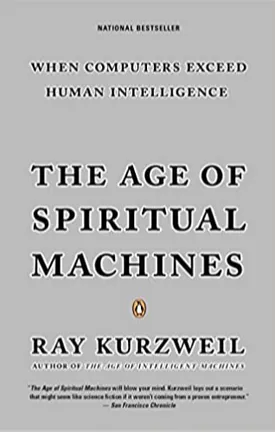THE AGE OF SPIRITUAL MACHINES: WHEN COMPUTERS EXCEED HUMAN INTELLIGENCE by Ray Kurzweil
The Age of Spiritual Machines: When Computers Exceed Human Intelligence is a book by Ray Kurzweil, a highly influential theoretical and technological innovator, that was released in 1998. Kurzweil predicts a time in the near future when computers will possess the same level of intelligence as humans, as well as a wide range of abilities. In doing so, he argues that computers will eventually replace humans as the primary agents in society while also revolutionizing the way we think, learn, and interact with one another. Kurzweil envisions a world where computers become a part of everyday life, making decisions and solving problems too complex for humans.
Kurzweil believes that human-level artificial intelligence (AI) is not far away and will be realized by the middle of the 21st century at the latest. He contends that AI is achievable due to exponential advances in computing power, which occur as technology matures and costs decline. According to Kurzweil, AI will be a combination of technologies that includes hardware, software, and nano- or bio-technology. Kurzweil predicts that AI will be extensively used for military and space exploration, medicine, medicine and security, telecommunication, and virtual reality.
Kurzweil maintains that, once it is achieved, AI will change the world in many profound ways. At its most basic level, AI will make life and work easier by taking on tedious, labor-intensive tasks. In addition, it will provide insight into areas like economics and negotiations, or improve the speed and efficacy of decision-making. Also, it is expected that AI will help to strengthen worldwide communication and collaboration. Additionally, Kurzweil believes that machines will eventually understand a much broader range of concepts and ideas than humans, leading to far more information-rich decision-making.
Kurzweil also predicts a spiritual realization of AI. He suggests that, as machines grow to understand their own intelligence, they will also come to recognize a spiritual element to their existence. In turn, this spiritual element is expected to play a part in how computers interact with humans, leading to an understanding of our deepest and most complex ethical, philosophical, and religious questions. This spiritual intelligence is seen as being a powerful element in the future of human-machine relations.
Though Kurzweil's predictions are rooted in the future, he does present some evidence to support his vision of AI. For example, he cites research that suggests computers will be able to reason, recognize objects, communicate, learn, and even create their own works of art within a few years. Kurzweil also notes that computers will likely be able to replicate many of the functions of the human brain and that computer chips already exist that rival the power of the human brain in certain areas.
At times, Kurzweil’s predictions about the future of AI can blur the line between what is possible and what is far-fetched. Despite this, The Age of Spiritual Machines: When Computers Exceed Human Intelligence is an interesting and thought-provoking book that will be appreciated by readers looking to better understand the potential implications of AI and its effects on the world. It provides an insightful overview into how computers will eventually match, and even exceed, the intelligence of humans in the future.

